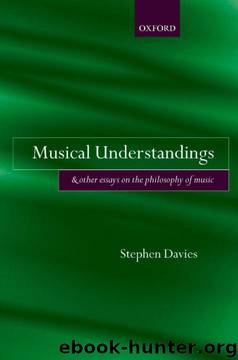Musical Understandings: and Other Essays on the Philosophy of Music by Stephen Davies

Author:Stephen Davies [Stephen Davies]
Language: eng
Format: epub
Published: 2012-08-30T19:03:00+00:00
Performance as practical knowledge
Musicians make music; that is, the performance of music involves applied knowledge or know-how. How does practical knowledge differ from discursive knowledge?
Consider acquired practical knowledge or `knowing how' more generally.32 It involves a learned skill or capacity to do somethingtypically, to perform an action-as in `I know how to ride a unicycle.'33 `Knowing how' can be subdivided into types. A first variety is always conscious. For most people, mental arithmetic is of this kind. It is not mental arithmetic they are doing if they do not follow an appropriate rule, algorithm, procedure, or principle, even if they fluke the right answer. Many practical skills are of this sort. I know how to fill in tax forms, immigration documents, and hire purchase agreements. In all these cases, the working of the skill and the steps through which it is exercised are held inevitably before my mind. A second type of `knowing how' might be termed `retrievable.' I know how to drive a car. Most of the time, I am not aware of the processes, judgments, and procedures that are involved. I do not have to think about my driving as I drive. Nevertheless, if I reflect on what I do, I can describe the steps or routines I go through. A third type of `knowing how' is cognitively impenetrable. Cognitively impenetrable processes are opaque to introspection. Some bit of neurological hardware receives an input, processes it, and outputs some result, but the nature of that processing is not recoverable by consciousness. The skill is learned but the many computational, muscular, kinesthetic, or other activities involved in the skill's application or execution are not available to the agent's awareness. From my own case, typical examples are of knowing how to walk, how to pick up a glass, and how to speak English.34 When a person intends to perform an action of this kind, he aims at it directly, as it were. He intends to turn his skateboard to the left, say, not to flex this muscle here and so. He can intend to produce a certain action as output, but the intermediate steps and movements involved in this, to the extent that they are controlled in an irretrievable fashion, are not what he can intend. Similarly, where `knowing how' is retrievable but automatic, the action is intended directly. The intermediary steps and movements are not what are intended so long as the action remains automatic.
In what ways is practical knowledge acquired? In some cases it can be learned from verbal descriptions of the appropriate basic actions and their sequences-'put the left leg in and shake it all about'-or of the relevant rules or algorithms-`multiply by 7Cr2.' In others, learning is by example, copying, or experimenting. Some procedures work better for some skills than others. Generally speaking, when we encourage children and stroke victims to walk we do not provide them with examples. By contrast, language skills are often conveyed via paradigm instances. And while it may be possible to
Download
This site does not store any files on its server. We only index and link to content provided by other sites. Please contact the content providers to delete copyright contents if any and email us, we'll remove relevant links or contents immediately.
The remains of the day by Kazuo Ishiguro(8981)
Tools of Titans by Timothy Ferriss(8369)
Giovanni's Room by James Baldwin(7330)
The Black Swan by Nassim Nicholas Taleb(7111)
Inner Engineering: A Yogi's Guide to Joy by Sadhguru(6785)
The Way of Zen by Alan W. Watts(6604)
Asking the Right Questions: A Guide to Critical Thinking by M. Neil Browne & Stuart M. Keeley(5762)
The Power of Now: A Guide to Spiritual Enlightenment by Eckhart Tolle(5761)
The Six Wives Of Henry VIII (WOMEN IN HISTORY) by Fraser Antonia(5505)
Astrophysics for People in a Hurry by Neil DeGrasse Tyson(5182)
Housekeeping by Marilynne Robinson(4436)
12 Rules for Life by Jordan B. Peterson(4299)
Double Down (Diary of a Wimpy Kid Book 11) by Jeff Kinney(4261)
Ikigai by Héctor García & Francesc Miralles(4249)
The Ethical Slut by Janet W. Hardy(4243)
Skin in the Game by Nassim Nicholas Taleb(4240)
The Art of Happiness by The Dalai Lama(4125)
Skin in the Game: Hidden Asymmetries in Daily Life by Nassim Nicholas Taleb(3993)
Walking by Henry David Thoreau(3953)
